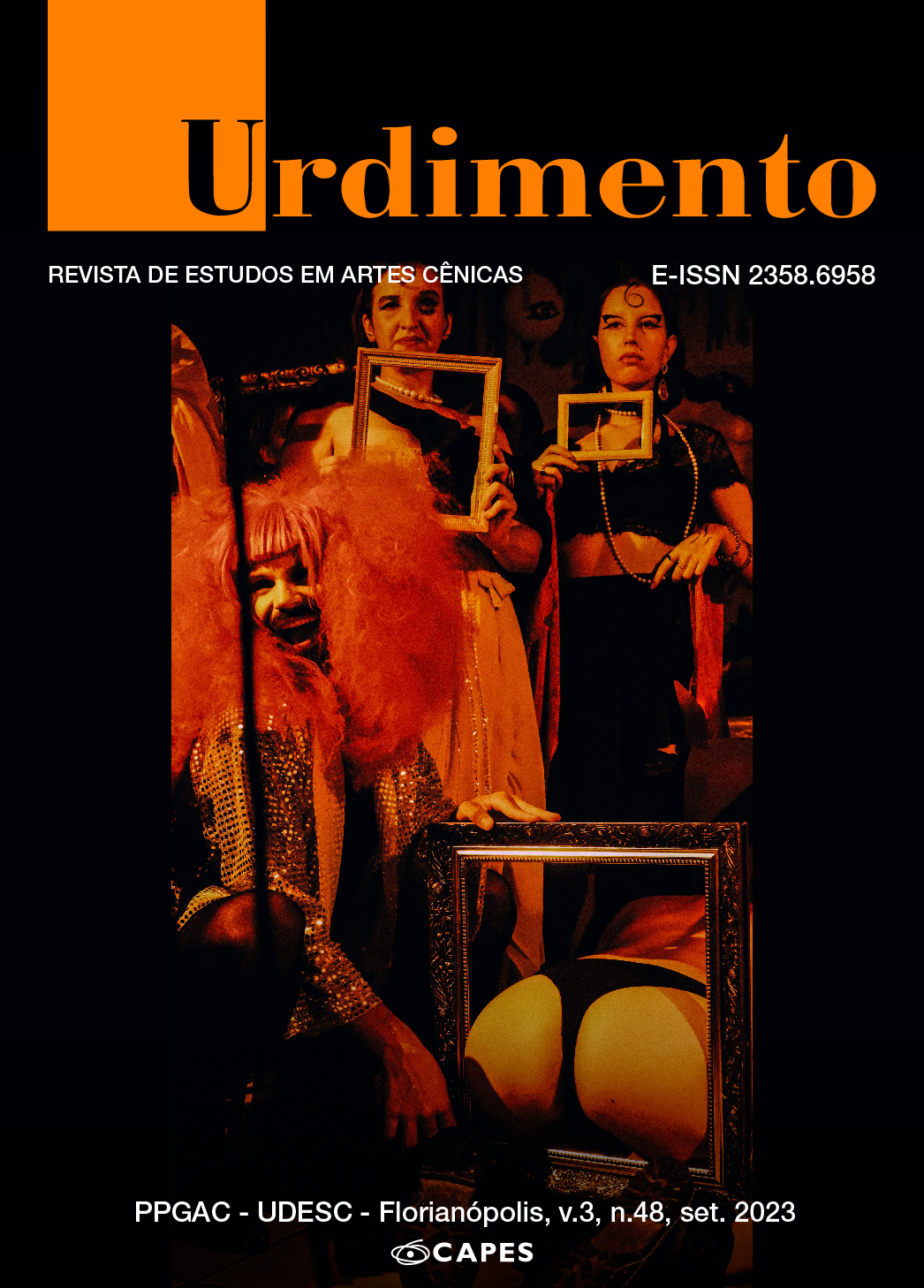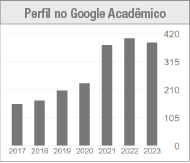Public engagement and spatial agency in the scenography of Baile
DOI:
https://doi.org/10.5965/1414573103482023e0202Keywords:
scenography, engagement, participationAbstract
Based on the analysis of the processes of conception, production and realization of the scenario of the play Baile, a graduation production for the students of the Teatro Universitário da UFMG, directed by Thálita Motta, this article intends to discuss how the scenography and the forms of space appropriation collaborate with the different ways of promoting the engagement of the reception in the artistic work, increasing the possibilities of relationship between the scene and the public. As a theoretical contribution, the contemporary discussion on Immersive Theater is mobilized, a way of proposing contemporary theater based on the production of experiences, as well as some previous staging proposals guided by the investigation of spatialities as relevant devices for visuality from the scene.
Downloads
References
ALSTON, Adam. Audience Participation and Neoliberal Value: Risk, agency and responsibility in immersive theatre. Performance Research, v. 18, n. 2, p. 128-138, 2013.
ARTAUD, Antonin. O teatro e seu duplo. 2. ed. São Paulo: Martins Fontes, 1999.
BISHOP, Claire. Antagonism and Relational Aesthetics. October Magazine, Cambridge, n. 110, p. 51-79, Fall 2004.
BOURRIAUD, Nicolas. Estética relacional. São Paulo: Martins Fontes, 2009.
BRECHT, Bertolt. Estudos sobre teatro. Trad. Fiama Pais Brandão. Rio de Janeiro: Nova Fronteira, 1978.
FERRER, Maria Clara. Olhar para aquilo que não se vê. Ensaio sobre uma poética das distâncias nas práticas cênicas de Lia Rodrigues e Antônio Araújo. Urdimento – Revista de Estudos em Artes Cênicas, Florianópolis, v. 2, n. 38, p. 1-24, 2020. DOI: 10.5965/14145731023820200014. Acesso em: 2 jun. 2023.
GROOT NIBBELINK, Liesbeth. ‘Radical Intimacy: Ontroerend Goed Meets the Emancipated Spectator’, Contemporary Theatre Review, v. 22, n. 3, p. 412-420, 2012.
GROTOWSKI, Jerzy. Em busca de um teatro pobre. 4. ed. São Paulo: Civilização Brasileira, 1992.
MACHON, Josephine. Immersive Theatres: Intimacy and Immediacy in Contemporary Performance. Basingstoke and New York: Palgrave Macmillan, 2013. Print.
RANCIÈRE, Jacques. A partilha do sensível: estética e política. São Paulo: Editora 34, 2005.
RANCIÈRE, Jacques. The Emancipated Spectator. London: Verso, 2009.
RODRIGUES, Cristiano Cezarino. Cenografia: um outro modo de experimentar e praticar. 2013.
f. Tese (Doutorado em Arquitetura e Urbanismo) – Escola de Arquitetura, Universidade Federal de Minas Gerais, Belo Horizonte, 2013.
RODRIGUES, Cristiano Cezarino. Espaço do jogo: espaço cênico teatro contemporâneo. 2008. 123 f. Dissertação (Mestrado em Arquitetura e Urbanismo) – Escola de Arquitetura, Universidade Federal de Minas Gerais, Belo Horizonte, 2008.
ROUBINE, Jean-Jacques. A linguagem da encenação teatral. 2. ed. Rio de Janeiro: Jorge Zahar, 1998.
SCHECHNER, Richard. 6 Axioms for Environmental Theatre. The Drama Review, v. 12, n. 3, p. 41-64, 1968.
WHITE, Gareth. On Immersive Theatre. Theater Research International, v. 37, n. 3, p. 221- 235, 2012.
WORTHEN, W. B. “‘The Written Troubles of the Brain’: ‘Sleep No More’ and the Space of Character.” Theatre Journal, v. 64, n. 1, p. 79-97, 2012. Available at: http://www.jstor.org/stable/41411277. Accessed on: 1 Apr. 2023.
Published
How to Cite
Issue
Section
License
Copyright (c) 2023 Urdimento: Revista de Estudos em Artes Cênicas

This work is licensed under a Creative Commons Attribution 4.0 International License.
Copyright Statement
The articles published by the magazine are free to use. The copyright is all assigned to the magazine. The articles whose authors are identified represent the expression from the point of view of their authors and not the official position of the journal Urdimento. The author (s) undertakes whenever publishing material relating to the article published in Revista Urdimento mention the said publication as follows: This article was originally published by Urdimento magazine in its volume (put the volume), number (put the number) in the year of (put the year) and can be accessed at:
http://www.revistas.udesc.br/index.php/urdimento
This work is licensed under a Creative Commons Attribution 4.0 International License.




